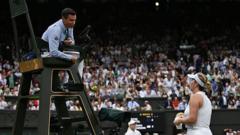Did Electronic Line Call Fails Steal the Show at Wimbledon?

Kartal Wins Controversial Game as Electronic Line-Calling System Fails
The world of tennis is no stranger to controversy, and the recent fourth-round match at Wimbledon between Anastasia Pavlyuchenkova and Sonay Kartal has only added fuel to that fire. This match, held during the iconic Wimbledon tournament, was marred by a significant failure of the electronic line-calling system—a technology that was introduced to enhance accuracy in officiating. The incident has raised questions about the reliability of technological interventions in sports, while also igniting discussions about fairness and sportsmanship. Let’s delve into the details of this contentious match, the implications of the line-calling failure, and what it means for the future of tennis officiating.
The Match Breakdown
On July 8, 2025, during a highly anticipated match at Wimbledon, Anastasia Pavlyuchenkova faced off against Britain's Sonay Kartal. At a crucial moment in the first set, with the score tied at 4-4, a pivotal backhand shot from Kartal was hit long. However, the electronic line-calling system failed to register the shot as 'out.' Instead of the expected call, chair umpire Nico Helwerth abruptly shouted, "stop, stop," leading to confusion among players and spectators alike.
Pavlyuchenkova had already recognized that the ball was out, stopping her play as a TV replay confirmed that the shot was indeed out by a considerable distance. The umpire's subsequent announcement that the point would be replayed instead of awarding it to Pavlyuchenkova triggered frustration and disbelief from the Russian player.
The Role of Technology in Tennis
The introduction of electronic line-calling systems at prestigious tournaments like Wimbledon aims to minimize human error and ensure fair play. However, this incident has highlighted the potential pitfalls of relying solely on technology. The All England Club had adopted this system to enhance the accuracy of calls, but this failure raises critical questions about the system's reliability and the protocols in place for handling malfunctions.
Technological systems in sports, including the electronic line-calling system, are designed to provide real-time feedback and decisions. Here are some potential benefits and drawbacks:
- Benefits:
- Increased accuracy in line calls
- Reduced pressure on human umpires
- Faster decision-making processes
- Drawbacks:
- Potential for technical failures
- Dependence on technology can lead to confusion
- May undermine the authority of human officials
Pavlyuchenkova's Reaction
After the controversial call, Pavlyuchenkova expressed her dismay to the chair umpire during the changeover, stating, “They stole the game from me. They stole it.” Her emotional response reflects the intense pressure players face during high-stakes matches and the impact that crucial calls can have on their performance and morale.
Following the incident, the All England Club released a statement acknowledging that the electronic line-calling system was deactivated due to operator error, which prevented it from tracking the critical point. They assured that the chair umpire followed the established protocol in addressing the issue. However, such explanations may not suffice for players who feel their hard work is jeopardized by technological failures.
Implications for Future Matches
This incident has sparked broader discussions about the future of electronic line-calling in tennis. As technology progresses, the expectation for accuracy and reliability increases. Players, fans, and officials alike are left to ponder whether the benefits of these systems outweigh the potential for failure.
Some key implications for future matches include:
- Reassessment of Technology: The All England Club and other tournament organizers may need to critically evaluate the systems in place to ensure they function as intended during crucial matches.
- Training for Officials: Enhanced training programs for officials could minimize the chances of operator error, ensuring that they are prepared to handle technical failures.
- Player Trust: Building trust between players and the officiating system is essential. Transparent communication about how technology is used and the protocols for addressing failures can help maintain this trust.
The Future of Officiating in Tennis
The evolution of officiating in tennis is inevitable as technology continues to advance. The current reliance on electronic systems raises critical questions about how matches are officiated and what the future holds for human referees. It is essential to balance technology with the human element of officiating to preserve the integrity of the sport. Here are some potential directions for the future:
Hybrid Officiating Models
One possible direction is the adoption of hybrid officiating models that combine human judgment with advanced technology. This could involve using electronic systems to assist human referees rather than replacing them entirely. Such a system could ensure that the human element remains intact while also benefiting from the accuracy of technology.
Enhanced Communication
Improving communication between players, umpires, and electronic systems is crucial. Clear protocols must be established for how to address technical failures in real-time, ensuring that players understand the process and outcome of such incidents.
Continued Innovation
As technology evolves, so too should the systems used in officiating. Ongoing research and development could lead to more reliable systems that minimize the risk of failure, providing players and fans with confidence in the officiating process.
Conclusion
The failure of the electronic line-calling system in the controversial match between Pavlyuchenkova and Kartal serves as a reminder of the complexities and challenges faced in modern sports officiating. While technology has the potential to enhance the accuracy of calls, it also carries the risk of significant errors that can influence the outcome of matches. As the tennis world reflects on this incident, it becomes clear that finding the right balance between technology and human judgment is paramount to maintaining the integrity of the sport.
What are your thoughts on the role of technology in officiating sports? Is it time to reconsider how we integrate these systems, or do you believe they are essential for the future of tennis? Let's keep the conversation going. #Tennis #SportsTechnology #Wimbledon2025
FAQs
What happened during the controversial match at Wimbledon?
During a fourth-round match between Anastasia Pavlyuchenkova and Sonay Kartal, the electronic line-calling system failed to call a ball out, leading to a replay of the point instead of awarding it to Pavlyuchenkova. This incident raised concerns about the reliability of technology in officiating.
How does the electronic line-calling system work?
The electronic line-calling system uses advanced technology to determine whether a ball is in or out by analyzing its trajectory and landing position. It aims to provide accurate and instant feedback to umpires during matches.
What are the potential drawbacks of using technology in sports officiating?
Some potential drawbacks include technical failures, confusion among players and officials, and the possibility of undermining human judgment. These challenges highlight the need for careful consideration in the implementation of technology in officiating.
How can officiating in tennis be improved in the future?
Improvements could include adopting hybrid officiating models that combine human judgment and technology, enhancing communication between players and officials, and continuing innovation in reliable officiating systems.
What was the reaction of the players involved in the incident?
Anastasia Pavlyuchenkova expressed frustration, stating that the game was "stolen" from her due to the error, while Sonay Kartal went on to win the match after the disputed point was replayed.
Published: 2025-07-06 14:32:03 | Category: sport



